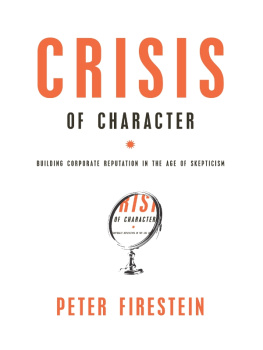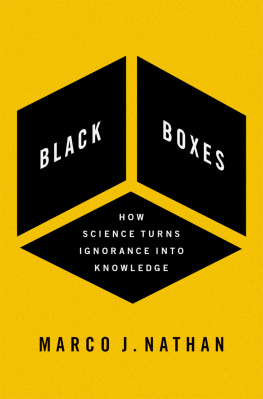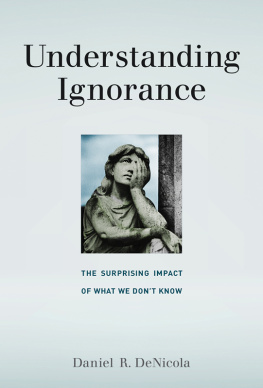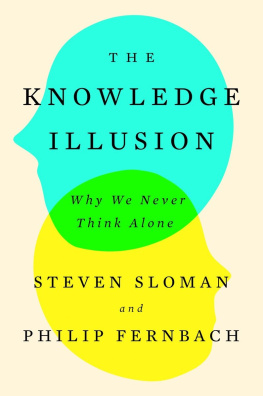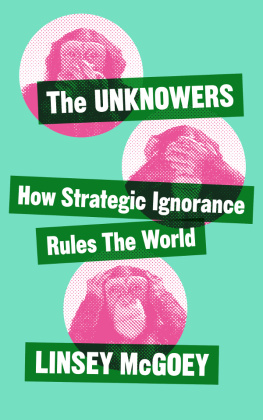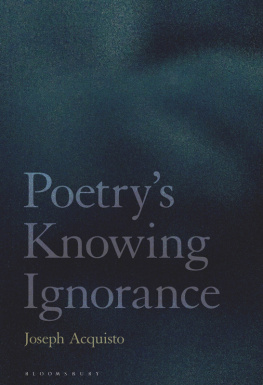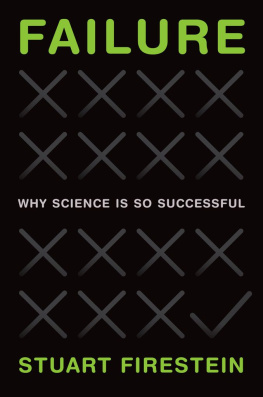Ignorance
Ignorance
How It Drives Science
Stuart Firestein


Oxford University Press, Inc., publishes works that further Oxford Universitys objective of excellence in research, scholarship, and education.
Oxford New York
Auckland Cape Town Dar es Salaam Hong Kong Karachi Kuala Lumpur Madrid Melbourne Mexico City Nairobi New Delhi Shanghai Taipei Toronto
With offices in
Argentina Austria Brazil Chile Czech Republic France Greece Guatemala Hungary Italy Japan Poland Portugal Singapore South Korea Switzerland Thailand Turkey Ukraine Vietnam
Copyright 2012 by Stuart Firestein
Published by Oxford University Press, Inc.
198 Madison Avenue, New York, New York 10016
www.oup.com
Oxford is a registered trademark of Oxford University Press
All rights reserved. No part of this publication may be reproduced, stored in a retrieval system, or transmitted, in any form or by any means, electronic, mechanical, photocopying, recording, or otherwise, without the prior permission of Oxford University Press.
Library of Congress Cataloging-in-Publication Data
Firestein, Stuart.
Ignorance : how it drives science/Stuart Firestein.
p. cm.
Includes bibliographical references and index.
ISBN 9780199828074 (hardback)
1. SciencePhilosophy. 2. Ignorance (Theory of knowledge)
3. Discoveries in science. I. Title.
Q175.32.K45F57 2012
501.9dc23
2011051395
1 3 5 7 9 8 6 4 2
Printed in United States of America
on acid-free paper
Acknowledgments
At the start of my Ignorance class, in response to the inevitable questions about grades, I warn the students, partially tongue in cheek, that they should consider carefully what grade they would actually like to appear on their records. After all, the transcript will read SNC3429 Ignoranceand do they want the grade that appears after this to be an A... or an F? There is some of the same uneasiness about acknowledging the many contributions of friends, colleagues, students, and family to a book called Ignorance. Nonetheless, my debt is great, and I can only hope that these many co-conspirators will be happy to have their names mentioned here. Special thanks then to the many wonderful students at Columbia University who gambled on taking a class called Ignorance and have added so much to it. Teaching this class has been one of the real highlights of my career at the University. And of course there are my courageous colleagues, working scientists who have taken two hours out of an evening and bravely put their ignorance on display, captivating and enlightening both the students and me. Some of them appear in the case histories that are part of this book, and the names of the others can be found at the Ignorance Web site. I had the tremendous fortune to have a member of my laboratory volunteer to be a teaching assistant at the outset of the class and he helped me develop it intellectually, and in many other ways that insured its success. His name is Alex Chesler and you will hear from him, Im sure. After Alex left, Isabel Gabel served as a teaching assistant and what was so special about Isabel was that she was a graduate student in the History Department and so brought quite a different and fresh perspective.
Several close colleagues and friends, scientists and humanists, have read various versions of this manuscript and have been extremely generous, not to mention unflinching, in their comments. They include Terry Acree, Charles Greer, Christian Margot, Patrick Fitzgerald, Peter Mombaerts, Philip Kitcher, Cathy Popkin, Gordon Shepherd, Jonathan Weiner, and Nick Hern. Many important things have been changed according to their critiques, but any foolishness that remains is entirely my responsibility.
Three years ago a small group of neuroscience graduate students and graduate MFA nonfiction writing students here at Columbia came to me with a proposal to form a writing group with the particular purpose of putting our heads together and trying to learn how to write about real science for a real public audience. This group has been dubbed Neuwrite, although our subjects often wander far afield of neuroscience. Sections of this book have been mercilessly workshopped by this remarkable and talented group, and it is impossible for me to overstate what I have learned through the generosity and insight of this band of young writers.
I have been fortunate to have several editors who have been not just supportive but truly enthusiastic about this project. First Catherine Carlin, who suggested making a book from the class, and more recently Joan Bossert, who has taken over this manuscript as though it were a child. It was Joan who asked Marion Osmun to perform a serious edit on an early draft and who so thoroughly got what the book was about. The Alfred P Sloan Foundation supports a program to make science accessible to the public, and they have been generous in supporting this project with a grant. I should also note that an early proponent of the importance of ignorance in science was a former director of the Foundation, Frank Gomoroy.
And mostly my greatest debt of gratitude is to my wife, Diana, and daughter, Morgan, who have shown unshakeable faith in my ignorance, and other important things, for as long as they have known me.
Contents
ONE
A Short View of Ignorance
TWO
Finding Out
THREE
Limits, Uncertainty, Impossibility, and Other Minor Problems
FOUR
Unpredicting
FIVE
The Quality of Ignorance
SIX
You and Ignorance
SEVEN
Case Histories
EIGHT
Coda
Ignorance
Introduction
It is very difficult to find a black cat in a dark room, warns an old proverb. Especially when there is no cat.
This strikes me as a particularly apt description of how science proceeds on a day-to-day basis. It is certainly more accurate than the more common metaphor of scientists patiently piecing together a giant puzzle. With a puzzle you see the manufacturer has guaranteed there is a solution.
I know that this view of the scientific processfeeling around in dark rooms, bumping into unidentifiable things, looking for barely perceptible phantomsis contrary to that held by many people, especially by nonscientists. When most people think of science, I suspect they imagine the nearly 500-year-long systematic pursuit of knowledge that, over 14 or so generations, has uncovered more information about the universe and everything in it than all that was known in the first 5,000 years of recorded human history. They imagine a brotherhood tied together by its golden rule, the Scientific Method, an immutable set of precepts for devising experiments that churn out the cold, hard facts. And these solid facts form the edifice of science, an unbroken record of advances and insights embodied in our modern views and unprecedented standard of living. Science, with a capital S.
Thats all very nice, but Im afraid its mostly a tale woven by newspaper reports, television documentaries, and high school lesson plans. Let me tell you my somewhat different perspective. Its not facts and rules. Its black cats in dark rooms. As the Princeton mathematician Andrew Wiles describes it: Its groping and probing and poking, and some bumbling and bungling, and then a switch is discovered, often by accident, and the light is lit, and everyone says, Oh, wow, so thats how it looks, and then its off into the next dark room, looking for the next mysterious black feline. If this all sounds depressing, perhaps some bleak Beckett-like scenario of existential endlessness, its not. In fact, its somehow exhilarating.
Next page

